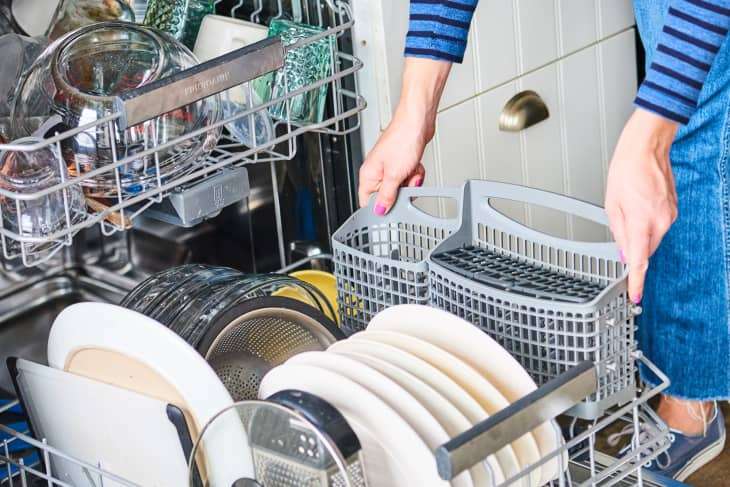Even if you’re a casual wine consumer, you probably know there’s a certain level of care required to keep those bottles in tip-top shape for drinking. Less obvious, though, are the rules of properly cleaning and maintaining your wine glasses —and yes, there actually are a few important steps you should be following to ensure your stemware remains as sparkling, intact, and ready for use as the day you bought it.
But first, forget everything you thought you knew about caring for your wine glasses. We asked Maximilian Riedel, 11th generation CEO and president of glassware company Riedel , to shine some light on the best ways to clean and care for wine glasses, and came back with a handful of de-bunked myths.
Ready to overhaul your cleaning routine and get those wine glasses shining brilliantly? Here are six stemware care tips that people usually get wrong.

1. The dishwasher is safer than hand-washing (if you place things properly).
You might have the idea that you should never place those delicate glasses in the dishwasher, but Riedel says a dishwasher is actually the best way to avoid the common breakages that occur “as a result of accidental mishandling when handwashing.”
But that doesn’t mean you can just throw your dishes in haphazardly. “It’s always safest to wash wine glasses on their own, separate from other dishes and flatware,” he says, as this eliminates the risk of other objects falling and cracking a glass. If you must clean them with other kitchen items, he notes, situate them so that they’re not touching anything else and don’t interfere with the spray arms.
“Stack your glasses on the top rack of the dishwasher and use the glass holder if your machine has one,” he continues, as this is made specifically to hold them in place. Finally, use the “air dry” setting on your machine and a dishwasher tablet that’s designed for glassware to avoid cloudy or dull glasses.
2. If you’re handwashing, use a cloth, not a sponge.
Though a dishwasher is best, it’s not always a viable option. If you don’t have one, that’s fine; however, there are a few rules you should follow to avoid the common breakage Riedel mentioned. That starts with your cleaning tools—i.e., don’t grab for that old sponge you’re using to clean the rest of your dishes, as it can harm the glass.
“I recommend using a soft, clean cloth, warm water, and if you’d like, a small amount of detergent; one drop is plenty,” says Riedel. For an environmental alternative, he also says you can use white vinegar in place of detergent. (Or—brace yourself—no soap at all, which he explains is a common practice among wine professionals, including himself.)
3. Don’t hold wine glasses with two hands.
According to Riedel, many people make the mistake of holding glasses incorrectly when cleaning, which can cause the stem to snap. To avoid this, make sure you never hold the bowl and the base at the same time so that you’re not placing unwanted pressure on that delicate area. Additionally, he says, you should always “hold the glass lower in the sink so it doesn’t have far to fall should it slip out of your hands.”
Once you’ve mastered your handling technique, focus on cleaning the rim and the outside of the glass, because, according to Riedel, rarely does the bowl get dirty. Though if you do want to target the inside, he says, just “swirl a little warm water and dish detergent (if you’d like), and rinse well.”
4. Don’t dry them upside down on a metal rack.
While Riedel says that it’s fine to air dry your glasses, make sure to avoid placing them upside down on a metal or wood rack because this can chip the rims when you’re transporting each piece. If you strongly prefer this method, though, Riedel recommends putting a tea towel on top and resting the glasses upside down on it. “The towel will help to protect the glass from chipping or scratching while still allowing it to aerate, preventing condensation.”
However, Riedel further explains that while air drying your glasses on top of a tea towel on a rack (or even just your counter) won’t harm them, it does increase the risk of water spots forming—so he strongly recommends drying your stemware immediately by hand after washing rather than just letting it drip dry itself.
5. Use two cloths when you’re drying (and not dish towels!)
Another thing that can damage the glass? Using a standard tea towel or dish cloth to dry; instead, Riedel recommends two microfiber cloths to avoid lint or streaks. “By using two cloths—one to hold the glass and another to polish—you avoid leaving behind any fingerprints.”
If you’re really looking to impress, follow this additional step prior to drying: “For extra brilliance and shine, carefully steam glassware over boiling water, such as from a teapot, before polishing,” says Riedel.
6. Don’t store them in the box, or even in the kitchen.
Once you’ve cleaned your glasses, don’t ruin all your hard work by storing them badly. “While some wine professionals recommend storing glassware in its original packaging, I advise against doing so,” says Riedel, explaining that this can give the glasses a “musty cardboard smell” that interferes with the wine’s aroma.
Instead, he suggests storing glasses in a closed cabinet away from the oven or stove “to prevent them from picking up cooking odors or gathering dust and grime between uses.” Finally, set each glass on its base to avoid chipping upon transport.
Anna Buckman
Contributor
